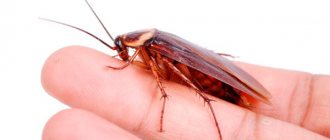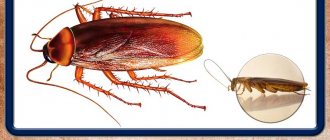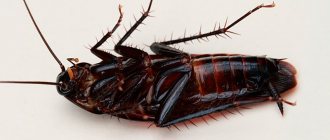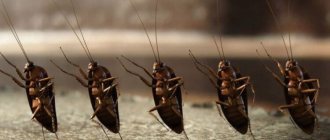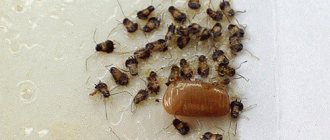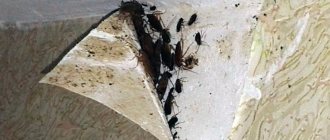Every owner of his own living space considers his home a safe place where no one can disturb him. And this is true, because it is perfectly protected from strangers. However, besides people, there are other creatures whose appearance is almost impossible to avoid - insect pests. One of the divisions of this group are cockroaches.
With their arrival, the desire to stay in the apartment becomes less and less, and there are more and more of them. Is there really no way to overcome this problem? We will tell you further about where cockroaches live in an apartment, what are the main sources of appearance and how you can detect them.
How to find out if there are cockroaches in an apartment
Cockroaches are timid and cautious insects, and therefore try to literally stay in the shadows; direct rays of light signal to them the danger of being noticed. Therefore, once inside the house, cockroaches choose darkened places hidden from view for shelter.
To understand that there are cockroaches in the apartment, it is enough to simply see at least one insect. As a rule, the first encounter with cockroaches at home occurs at night, when you suddenly turn on the light in the kitchen or bathroom. At night, cockroaches crawl out of their crevices and go in search of food and water, but they are often seen during the day.
An indirect sign of the presence of cockroaches in the house will be the products of their vital activity - dark fecal spots and capsules with eggs, called ootheca. Such evidence is found, for example, in kitchen drawers, under the sink, or on the hinges of cabinets and interior doors. And the fact that the colony of cockroaches in the apartment has reached alarming proportions will also be indicated by a specific smell.
What can be done to stop cockroaches from multiplying?
There are a sufficient number of insecticides that fight these insects very successfully if used correctly. But poisons alone are not enough: in order for your apartment to cease to be attractive for reproduction, it is advisable to fulfill a number of conditions.
- Frequently check and treat dark and damp nooks and crannies with poison as a preventative measure, especially if you know that cockroaches may return or pass to you from your neighbors.
- Control the humidity in the apartment, especially if you live in a region with high air humidity in general. This can be done using a regular air conditioner.
- Do not leave food in the open that cockroaches could eat, and get rid of the habit of eating without a plate and in bed: this is how crumbs spread throughout the apartment in large quantities.
- Do not forget about repeated treatments: the swelling does not allow chemicals to pass through, so the nymphs that appear after the first treatment will be absolutely healthy. And given that they can regulate the speed of development themselves, it will not be difficult for them to wait out difficult times in the capsule.
- If you want to get rid of the nest quickly and without poisons, you will have to turn off the heating for a while in winter, killing all the cockroaches at sub-zero temperatures (even at -5˚C they will die almost instantly).
Without treatment, it is quite difficult to deal with an existing large nest, but once you get rid of it, you can use the information received to ensure that your apartment will never again become a haven for these insects.
Where do cockroaches live in an apartment?
So, cockroaches find convenient crevices, cracks, gaps and other secluded places in the house, and arrange shelters there. To feel comfortable, cockroaches require warmth, as well as access to water and food. According to these parameters, the kitchen, bathroom and toilet are ideal in the apartment - the top rooms where cockroaches live.
Areas suitable for cockroaches to live in the kitchen: the space under the sink, behind and under the refrigerator, inside built-in kitchen furniture, inside a microwave oven and other kitchen appliances. In addition, cockroaches inhabit cracks in baseboards and ceiling moldings, cavities under peeling wallpaper, gaps between hanging cabinets and the wall, hidden spaces on the floor under the kitchen work area, ventilation holes, and so on.
In sanitary rooms, cockroaches hide under the bathtub, under the hanging mirror, in cabinets, in boxes hiding pipe risers. If the rooms are lined with plastic panels, this creates a lot of additional space where cockroaches can hide.
As the colony grows, synanthropic pests also look for places convenient for shelter in other rooms of the apartment: this includes furniture, baseboards, and household appliances - any secluded corner. The number of hiding places for cockroaches in an apartment directly depends on its technical condition. If the house has not been renovated for a long time, there are a lot of cracks in the floor and walls, and the wallpaper is peeling off, then cockroaches have room to roam.
The situation with cockroaches also depends on how carefully the house is kept clean and tidy. If the owners do not allow dirty dishes, crumbs and food leftovers to remain on the tables overnight, if the floor is regularly wet cleaned, and grease does not accumulate on the kitchen stove, then it will not be easy for cockroaches to find food.
However, the fact that there are cockroaches in the house does not necessarily indicate a low level of sanitation; unfortunately, sometimes pests appear even in the kitchen of clean housewives. But in a clean and well-kept house, cockroaches are much less likely to settle for a long time.
Reproduction process
If you have ever found a cockroach nest at least once in your life, this picture will stay with you for a long time. How many of them are there: tens, hundreds, thousands? It seems that the population of these insects is growing literally before our eyes! But how quickly do cockroaches actually reproduce?
- In order for a new generation to appear, it is necessary to have two sexually mature individuals, male and female, since they reproduce sexually. The female is slightly larger in size and secretes odorous substances, inviting the male to mate, after which she lays eggs.
This is interesting!
Most species of cockroaches have wings, but the need to use them in an apartment has long ceased.
- Over about 2-3 weeks, the eggs develop into the first larval stage in a special protective capsule called an edema, which the female carries with her for a while and then leaves in a safe place.
- When the first stage of larval development is reached (and this can take more than 3 weeks), if environmental conditions are unfavorable, the juveniles leave the edema. If when you hear the word “larva” you imagine something inactive and worm-like, then cockroach larvae will surprise you. They are called nymphs and look like a miniature version of the adult. Accordingly, they eat and run around the apartment just as actively.
By the way
The older the domestic cockroach, the lighter its color: if adult individuals - imago - have a reddish color, then the larvae are almost black.
- Cockroaches undergo an incomplete process of metamorphosis: there is no pupation stage. And they grow with the help of molts, of which there are 5-7 throughout the life of the larvae. Each molt brings the individual closer to sexual maturity, but how quickly this process takes place depends only on external conditions. If the nymphs are in a warm and humid place with an abundance of food, they will be ready for fertilization after 4 months. The colder, drier and hungrier it is, the longer it will take the insect to reach sexual maturity.
- A sexually mature individual of a domestic pest lives for about 7 months. How often can she give birth to new offspring? The problem is that after the first fertilization, the female stores the male's reproductive cells for subsequent clutches and, under favorable conditions, will not miss the opportunity to lay eggs about twice a month. On average, during her life she manages to lay 10-15 clutches of 15-20 eggs in each edema.
By the way
There are viviparous species, such as Madagascar cockroaches, that can be kept as pets. This system is also characteristic of some other large tropical species.
It turns out that red cockroaches reproduce not too quickly, but in geometric progression. And in order to start a nest, all it takes is one sexually mature female, who accidentally wandered into your apartment and found the conditions in it suitable. Adding fuel to the fire are the larvae, which look almost the same as the adults. But why did they find your home attractive?
ggne
How to find a nest of cockroaches in an apartment
At the initial stage of infestation of an apartment, cockroaches behave cautiously and try not to be seen, only emerging at night to search for food. But if at least one was noticed, it means that insects intend to settle here, and perhaps a nest of cockroaches has already appeared in the apartment.
To find out and prevent cockroaches from breeding, arm yourself with a flashlight and inspect the apartment, starting with the kitchen and bathroom. Check cabinets under sinks, kitchen drawers, food and dish cabinets and shelves, look under window sills and behind radiators. Move the refrigerator away from the wall and inspect the back wall, remove or lift wall cabinets to see if cockroaches are hiding under them. Use a flashlight to illuminate the ventilation openings and risers, and check the space under the bathtub and washing machine.
Also look under the microwave, electric kettle, coffee maker and other appliances. Cockroaches love to hide in cardboard boxes, so check them if you have any. If the linoleum in your kitchen or bathroom is loose, lift up the edges and inspect the floor, paying attention to the corners.
In areas that are not accessible to visual inspection, you can use a steam generator with a narrow nozzle - direct a stream of pressurized steam into the cracks of baseboards or the gaps between kitchen cabinets and find out if anyone is hiding there. An aerosol can of household insecticide is also suitable for this purpose.
Using the same principles, conduct an inspection in the hallway, bedrooms and other rooms. When examining, look for both live cockroaches and traces of their vital activity - dark spots, eggs and dry remains of dead insects.
Appearance of an insect
Almost everyone probably knows what a cockroach looks like. Regardless of the variety, insects have a number of similar characteristics.
Body length can vary from one to ten centimeters; as a rule, the largest representatives of the family live mainly in southern countries with a mild and humid climate. The abdomen is divided into several main segments.
Males are distinguished by a longer and narrower body; at the end of the abdomen there are articulated processes called cerci.
Females have a more rounded body; when breeding offspring, they carry an ootheca on their abdomen - a capsule containing several dozen eggs. Most representatives carry edema until the larvae hatch.
Cockroaches die quickly at high temperatures and frost
It is known that cockroaches generally cannot tolerate negative temperatures. In this regard, they are even more vulnerable than bedbugs: bedbugs can survive long-term cooling down to -5 - -10°C, and cockroaches die at -5°C within a few hours.
Likewise, both red and black cockroaches die in less than an hour at air temperatures above +45°C.
This means that you can destroy them indoors, for example, using an industrial heat dryer. They warm up the air to 50-55°C, this temperature is maintained for 1.5-2 hours, and there are no live cockroaches left here. Moreover, such a disposal will be completely safe for people and pets - cats and dogs.
Cockroaches can and should be poisoned by teaming up with neighbors
This is obvious: if cockroaches live with neighbors, then it is from the neighbors that they can migrate to you after destruction. If you team up with your neighbors and poison cockroaches in all neighboring apartments at once, then there will be no re-infestation - the cockroaches simply will have nowhere to come from. Provided, of course, that not a single treated apartment borders an infected premises.
Therefore, re-infestation occurs much less frequently in private houses: they do not border on other premises at all, and in order to infect them, cockroaches must come here through the street, which happens relatively rarely.



